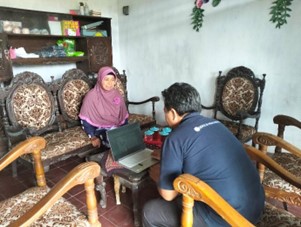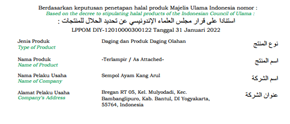
One of the Sustainable Development Goals is responsible consumption and production (Goal 12). Awareness on halal products is one way to ensure that products are suitable for consumption. The issuance of Law No. 33 of 2014 concerning Halal Product Guarantee (JPH), the halal issue has gained clarity on its position and role in the life of the nation and state in Indonesia. Halal is not only an obligation for Muslims in production and consumption but has also evolved into a promising industry, where the users of its products are not limited to Muslims alone. The growth of this industry is in line with the 9th Sustainable Development Goal, which focuses on industry, innovation, and infrastructure.
Desa Preneur is a village-level program initiated by the DIY Provincial Government, as part of the region’s distinctive privileges, funded by the Special Allocation Fund, and technically implemented by the Cooperatives and MSME Service. K45PAK (Kiblat 4-5 Pancer Adiluhung Kawentar) is one model for the development of Desa Preneur. One form of development conducted by the K45PAK Team focuses on the production aspect, which is encouraging MSMEs to obtain Halal Certification. According to Law No. 33 of 2014 on JPH, products that enter, circulate, and are traded within Indonesia must be Halal certified. This Halal certification requirement is regulated by Government Regulation No. 39 of 2021 on the Implementation of the JPH Field, which outlines a phased process. The first phase of this Halal certification obligation will end on October 17th 2024. Producers hope that Halal Certification will have a positive impact on their sales, profits, and overall welfare.
The research grant from the Graduate School of UGM in 2024, the Islamic Economics Study Program conducted research aimed at exploring the impact of Halal Certification on the development of food and beverage MSMEs in the Desa Preneur K45PAK Model and recommending policies and business strategies to enhance the performance of these MSMEs. The research method used is a combination of qualitative methods with a case study approach and quantitative methods with a statistical approach.
The research shows that Halal Certification does not always directly impact sales and profits. Halal Certification does not have an immediate effect on increasing sales and profits, but rather with enhancing the confidence of producers in marketing their products and gaining consumer trust and acceptance, which results in an expanded market segment and a growing customer base. Improving product quality beyond Halal Certification (such as product quality, packaging quality, and other legalities) and marketing strategies (including market analysis, brand identity, packaging, content creation, and appropriate use of marketing media) are essential for Halal Certification to lead to an increase in sales and profits.
Author: Dr. Duddy Roesmara D, Nanung Danar Dono, Ph.D., and Dr. M. Iqbal Ahnaf



